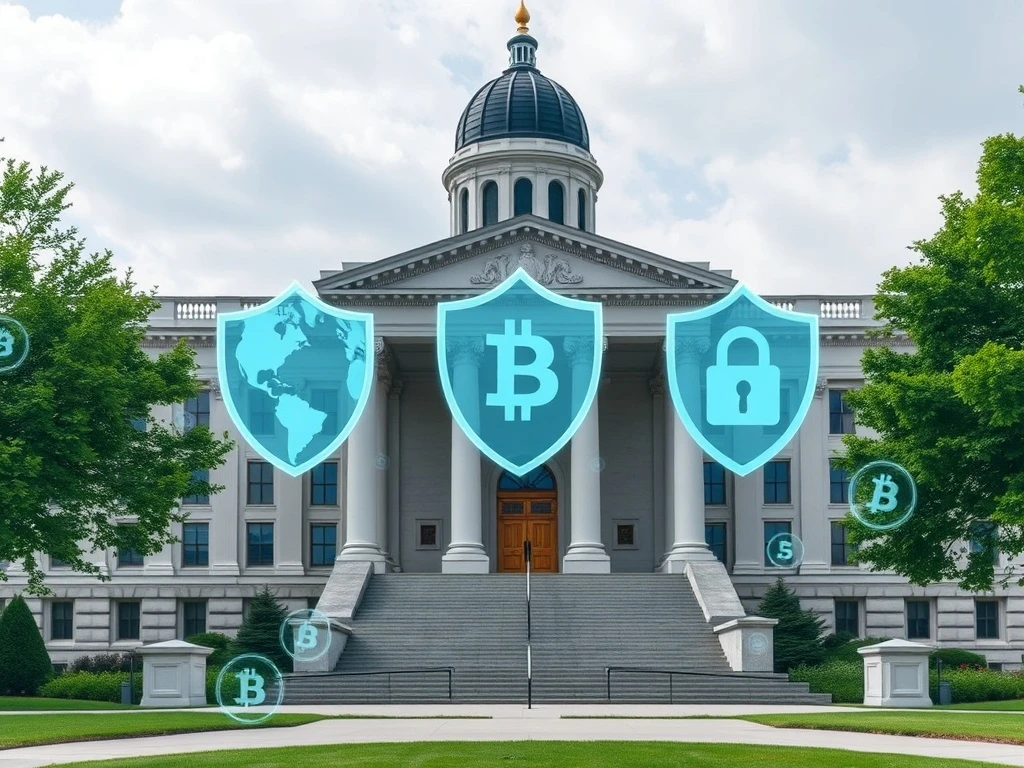Crucial Illinois Crypto Regulation: State Implements Tough Consumer Protections

The landscape of digital assets constantly evolves. Consequently, regulatory frameworks must adapt. Illinois recently took a decisive step. The state enacted new legislation aimed at enhancing consumer safety within the cryptocurrency sector. This move establishes significant new **Illinois crypto regulation**. It sets a precedent for other states. It also signals a divergence from certain federal approaches to digital asset policy.
Pioneering Crypto Consumer Protection in Illinois
Illinois Governor JB Pritzker signed two landmark bills into law on Monday. These bills focus on robust **crypto consumer protection**. Governor Pritzker emphasized the state’s commitment. He stated that Illinois is implementing ‘common-sense protections’ for investors and consumers. This contrasts with federal policy. The Trump administration, he noted, allows ‘crypto bros’ to influence policy. This firm stance positions Illinois as a leader in digital asset oversight.
The first bill, the Digital Assets and Consumer Protection Act (SB 1797), grants the Illinois Department of Financial and Professional Regulation significant authority. It empowers them to oversee digital asset exchanges and businesses. This legislation passed the Illinois Senate in April. Its provisions are comprehensive. They aim to align crypto operations with traditional financial service standards. Key requirements include:
- Maintaining adequate financial resources.
- Implementing strong cybersecurity measures.
- Enforcing robust anti-fraud protocols.
- Providing clear investment disclosures.
- Adhering to strict customer service standards.
These measures are vital. They protect individuals from evolving threats. Governor Pritzker reiterated this point. He asserted that Illinois will not tolerate exploitation. The state safeguards its residents’ hard-earned assets.
Strict Crypto ATM Limits and Operator Requirements
Further strengthening the regulatory environment, Governor Pritzker also signed The Digital Asset Kiosk Act (SB 2319). This bill specifically targets cryptocurrency kiosks, commonly known as crypto ATMs. These machines have become a conduit for scams. Therefore, the new law imposes strict rules on their operation. Operators must now register with state regulators. This ensures accountability. Furthermore, the bill mandates full refunds for scam victims. This provision offers a critical safety net. It protects vulnerable users from financial loss.
The legislation also introduces significant financial limitations. It caps transaction fees at 18%. This prevents excessive charges. Additionally, it limits daily transactions to $2,500 for new customers. This measure aims to reduce the risk of large-scale fraud. Representative Edgar Gonzalez Jr. supported these efforts. He emphasized the need for consistent safeguards. These protections apply regardless of the financial service used. This ensures equitable treatment for all Illinois residents. These **crypto ATM limits** aim to create a safer environment for digital asset transactions.
A Contrasting Stance on US Crypto Policy
Illinois’s regulatory push highlights a growing divide. State-level crypto policy has become increasingly polarized. Some states, like Texas and Arizona, actively embrace the crypto industry. They promote a more permissive regulatory environment. Conversely, Democrat-led states, such as Illinois, adopt a more cautious approach. They prioritize consumer protection and stringent oversight. This divergence reflects differing philosophies on digital asset governance. It also shapes the broader landscape of **US crypto policy**.
Governor Pritzker’s office continued to criticize the Trump administration’s approach. They argue that federal policy has actively deregulated the crypto industry. This deregulation, they contend, increases consumer risk. They specifically cited Trump’s April signing of a bill. This bill overturned a revised IRS rule. The original rule expanded the definition of a ‘broker’ to include decentralized finance (DeFi) exchanges. This action, from Illinois’s perspective, undermines efforts to ensure transparency and accountability in the digital asset space. Such federal actions underscore the need for state-level initiatives. These initiatives provide necessary safeguards.
Bolstering Digital Asset Oversight Amidst Fraud Concerns
The urgency for robust **digital asset oversight** is clear. Fraud remains a significant concern in the crypto space. The FBI reports substantial losses from crypto fraud cases. In 2024 alone, approximately $272 million was lost nationwide. Illinois ranked as the fifth-highest state for these losses. This statistic underscores the vulnerability of consumers. It also highlights the critical need for regulatory intervention. The new Illinois laws directly address these risks. They provide a framework to mitigate fraud and protect investors. By requiring exchanges to maintain financial resources and implement anti-fraud measures, the state directly tackles these issues. These proactive steps aim to reduce the financial impact of scams on residents. They also foster greater trust in the digital asset ecosystem.
Illinois’s Past: A Cautious Approach to Bitcoin
Illinois has consistently demonstrated a cautious stance toward cryptocurrencies. This is not its first legislative foray into the digital asset world. The state previously quashed a bill suggesting an investment in Bitcoin (BTC). Illinois Representative John Cabello introduced House Bill 1844 in January. Its purpose was to create a strategic Bitcoin reserve. The state treasury would buy and hold the asset for five years. However, this bill failed to pass voting at the Committee level. This earlier legislative outcome reinforces Illinois’s generally conservative approach to crypto. It contrasts sharply with states exploring Bitcoin as a treasury asset. Therefore, the recent consumer protection bills align with Illinois’s established regulatory philosophy. They prioritize stability and consumer safety over speculative investment.
The Future of Digital Asset Regulation
These new laws represent a significant milestone for **Illinois crypto regulation**. They establish a comprehensive framework. This framework aims to protect consumers and ensure market integrity. The state is setting a standard for responsible digital asset growth. As the crypto industry continues to expand, other states may follow Illinois’s lead. This could lead to a patchwork of state-level regulations. Such a scenario would further highlight the ongoing debate about federal oversight. Ultimately, Illinois’s actions underscore a commitment. The state prioritizes its citizens’ financial security. It seeks to navigate the complexities of the digital economy responsibly.








